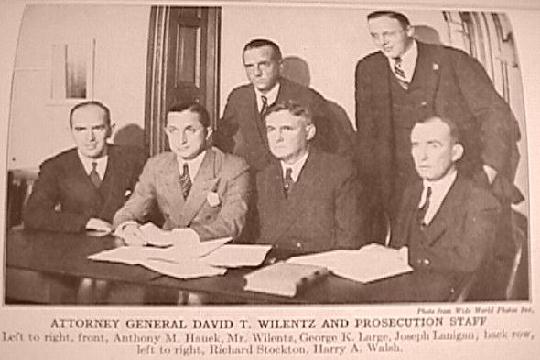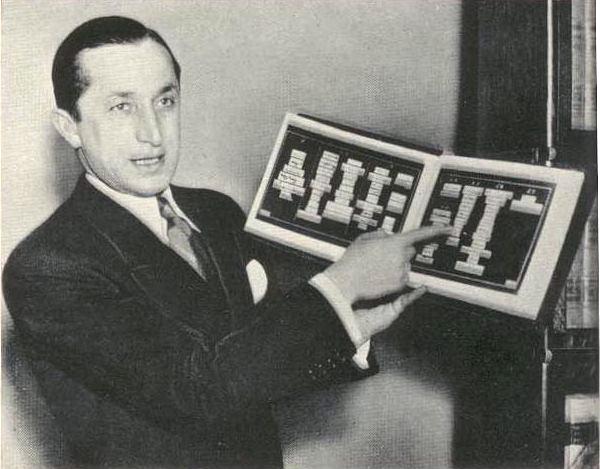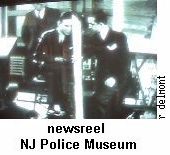![[ACLU Execution Watch
Counter]](http://www.aclu.org/graphics/dpcounter.gif)
Directory
Books
Search Home
Transcript
Forum Sources
![[ACLU Execution Watch
Counter]](http://www.aclu.org/graphics/dpcounter.gif)
by Judge W Dennis Duggan, JFC
reprinted from The Albany County Bar Association Newsletter 01/04
![]() Harold Fisher,
Wilentz Assistant
Harold Fisher,
Wilentz Assistant ![]() ABA Pres.
DiLeo
ABA Pres.
DiLeo
![]() Lindbergh
Kidnapping Hoax Forum
Lindbergh
Kidnapping Hoax Forum
![]() Lindbergh Kidnapping Hoax
You Tube Channel
Lindbergh Kidnapping Hoax
You Tube Channel

The Prosecution Team consisted of five men - Anthony Hauck, Jr., Joseph Lanigan, Robert Peacock, and George K. Large. but only one man took all of the glory. David T. Wilentz the Attorney General of New Jersey.
Wilentz, a Democratic foe of Republican Gov. Harold G. Hoffman, built his reputation upon the sensationalism and "success" of this horrendous trial.
The New Jersey law firm the Attorney General founded, Wilentz, Goldman and Spitzer, is still in business. Whether or not anyone at Wilentz, Goldman and Spitzer takes pride in their founder's involvement with such a miscarriage of justice is not evident. There is only a brief statement acknowledging Wilentz' part at the Flemington Trial in the firm's description.
Freedom of Information Act - 1368 pages of Lindbergh Files Online Free!
Wilentz and his assistants gathered lots of questionable "evidence" against Hauptmann. The Attorney General is pictured below with samples of handwriting his team used against the defendant. The "expert" witness on handwriting, would later be exposed for having made horrendous misjudgments such as the Howard Hughes fiasco.
One look at the time sheets from the Reliance Management with blobs of ink over the check marks, indicating Hauptmann told the truth when he claimed to have been working on March 1 and April 2, would make anyone skeptical of the integrity of this prosecution team.
Never were these lawyers required by law to reveal any part of their case to defense attorney, Edward Reilly. Without "rules of discovery" in court proceedings of that day Wilentz was able to get away with "murder." He would later be known to Jerseyites as "the Pope of Perth Amboy" because of his powerful grip on the politics of his state. There is no question that his popularity and power stemmed from this trial. The only question that remains is - did David Wilentz put his own aspirations ABOVE any concern for a FAIR trial?

DAVID WILENTZ' LEGACY
NJ Chief Justice Robert Wilentz 1979 - 1996
click here to read the Trenton Times obit/editorial (contributed by Ellie)
David Wilentz' son, Robert Wilentz, was the Chief Justice of the New Jersey State Supreme Court from 1979 until his death in 1996.
(a note: David Wilentz' daughter was married to Leon Hess - owner of the NY Jets and all those gas stations.)
It was at the height of Robert Wilentz's tenure as Chief Justice that Anna Hauptmann and her attorney, Robert Bryan, were denied a reopening of the case. Even though the appeal was made in Federal Court, (not New Jersey Supreme Court), the opportunity for such a major familial connection in squelching Hauptmann's exoneration, is quite probable.
Much of Bryan's appeal had been based on new evidence revealed by New York Post investigative reporter, Anthony Scaduto. Other researchers, using the Freedom of Information Act to uncover the misdeeds of Wilentz and his team have also realized the probability that a frameup took place.
For Anna Hauptmann that denial to review her husband's case must have felt like a second execution of her husband. When the appeal was denied, NJ Gov. Florio, not wanting to repeat the mistakes of Mass. Governor Dukakis (who risked his political career by exonerating Sacco and Vanzetti), told the elderly widow that history will have to be the judge. Anna died waiting for history.

Harold Fisher, Assistant to Wilentz at Hauptmann Trial
New Jersey Law Journal March 16, 1992
IN PERSONAM; Obituary
By Richard Pliskin
Harold Fisher, namesake of Morristown's Shanley & Fisher and a lawyer known
for his intellectual depth and athletic life, died on March 6 at the age of 92.
Fisher died of pneumonia at Mountainside Hospital in Montclair. He had lived
in Upper Montclair and on his farm in Allamuchy.
His death came 11 days after that of firm co-founder Bernard Shanley, who
died Feb. 25 at the age of 88.
In many ways, Shanley and Fisher were opposite. Where Shanley was the
affable man of politics who served as President Dwight Eisenhower's deputy chief
of staff, Fisher was quiet and academic, content to pore through the law books
in search of a fresh angle on a tough problem.
"He loved the intricacies of the law," says Shanley & Fisher's managing
partner, John Kandravy. "The more challenging the issue, the more exciting it
would be."
Nor was Fisher too proud to take second seat in a big case, as in the 1935
Lindbergh baby trial in which Fisher backed up New Jersey Attorney General David
Wilentz as a special assistant in the trial of Bruno Hauptmann.
Called the "forgotten man" in the case, Fisher was an integral
behind-the-scenes partner on the prosecution team that helped with the
conviction. Throughout his career, in fact, Fisher worked on special assignment. While
the had been temporarily dispatched to the Hauptmann trial from his post as an
aide to Circuit Court Judge Joseph Smith in Newark, Fisher was plucked in 1941
from private practice by Gov. Charles Edison to investigate the State Highway
Department. Edison called on him again two years later for another special
probe, this one into the Civil Service Department.
And in 1954, Gov. Robert Meyner appointed Fisher to investigate the
Unemployment Compensation Commission.
[This investigation is what led to the downfall and death of Gov Harold G Hoffman- the man who tried, but failed, to save Hauptmann from an unjust execution in 1935.]
Fisher was born of Jan. 21, 1900, in Amasia -- now called Armenia -- as
Hracthcia Balikian. His family -- parents, five brothers, and two sisters --
later fled to the United States during the persecution of Armenians in the early
part of the 20th Century, settling in Tennent in Manalapan Township, Monmouth
County, in 1913. [Amazing that Fisher, like Wilentz, had no sympathy for the plight of Hauptmann who was being persecuted for his foreign-ness!]
Upon arriving in this country, the family changed its name from Balikian,
which translates into English as "son of a fisherman," t Fisher.
Intensely proud of his ethnic heritage, Fisher never lost an opportunity to
remind his colleagues of his Armenian background, Kandravy says
Fisher attended public school in Freehold and later Rutgers University and
Columbia Law School, from which he graduated. From 1928 to 1933, Fisher worked as a special assistant prosecutor to Joseph
Smith, the Essex Country prosecutor who later became a circuit court judge.
IN 1946, Fisher joined Young, Shanley & Foehl, to which Fisher's name was
added. The firm, which began in 1933 as Shanley & Young, became Shanley &
Fisher in the mid-1950s.
Outside of the law, Fisher enjoyed painting landscapes in watercolor. His
daughter-in-law, Cynthia Fisher, says he often painted scenes from his dairy
farm in Allamuchy. Fisher also was "an incredible hiker," she says, climbing
the Matterhorn at the age of 67. She says Fisher also was an avid gardener.
Fisher retired as an active partner in the firm in January 1975. Kandravy
says the firm will keep the Shanley & Fisher name because it has become
institutionalized.
New Bar President Dileo Is a Hands-on Manager (excerpts)
New Jersey Law Journal
May 16, 1991
By Henry Gottlieb
.... Several trustees say that Dileo's friendship
with Chief Justice Robert Wilentz -- they were colleagues at the Wilentz firm
from 1953 to 1979 -- could affect the Bar's dealings with the courts. But they
disagree on what the effect could be.
The Wilentz Connection
Some trustees say the relationship will smooth relations between the two
institutions -- the courts and the Bar -- while others say the relationship
might prevent Dileo from making moves that might appear confrontational. The
two principals reject both notions.
Wilentz says Dileo is a hard-working, dedicated lawyer, with whom he has had
"a long and close and wonderful relationship." When it comes to bench-Bar
relationships, "Matt is a man of high integrity. There is no doubt in my mind
that his loyalty to the Bar is strong, and he will be absolutely independent of
any friendship he has had with me." Wilentz says he would be independent of
Dileo, too.
Dileo adds, "We had a great working relationship, but we didn't always
agree." The relationship will not have an effect, he says.
Other issues face the new president. He says he wants to improve the
organization's lobbying efforts, and wants to increase the number of members in
the association.
He says he also expects to take the lead in programs to help lawyers impaired
by addiction to alcohol and drugs. The board of trustees recently approved a
report calling for the establishment of a lawyers' assistance program to provide
counseling and other help for lawyers with chemical dependencies. Help would be
especially important for solo and small firm lawyers who are not covered by
employer assistance programs, the committee said.
Like his recent predecessors, Dileo has a special theme for his presidency
Outgoing president Alan Pogarsky's theme was "Quality of Life," and during
Pogarsky's tenure, the Bar undertook studies or whether lawyers were
dissatisfied with their professional existence, and how the quality of their
lives could be improved.
Dileo's theme is "Professionalism," a one-word slogan that represents Dileo's
desire to undertake initiatives to improve the image of attorneys.
"I think attorneys get a bad rap from the media, the commentators, reporters
-- the whole business of lawyer bashing," Dileo says. The problem stems from a
few bad apples in the profession like those who hand out business cards at
disasters or misappropriate funds, he says. He will appoint a
"professionalism" committee to look into the problem from two angles, improving
the image and improving the lawyers.
"I think it's all a perception problem, and I want to do something about the
perception," he says. "I want to do it two ways, by educating the public about
who we are and what we do . . . and by increasing our awareness and enhancing
our professionalism."
He adds: "I think lawyers get a bad rap, but because of the perception that
the public has out there we have to be better than we are. We have to be held
to a higher standard of conduct."
Dileo, who grew up in the predominantly Italian Chambersburg section of
Trenton, says his boyhood ambition was to be a lawyer, and after World War II he
went to Rutgers and Rutgers Law School on the GI Bill. He says his hiring by
the Wilentz firm was a case of being in the right place at the right time.
In 1953, the firm had an opening because a pregnant associate left, and the
Appellate Division judge for whom Dileo was clerking, Ralph Smalley, recommended
Dileo for the job.
When Dileo started, the firm had eight lawyers -- including three Wilentzes
and a Wilentz brother-in-law, George Goldman. There was David Wilentz, the
legendary former attorney general, Democratic Party guru and prosecutor of Bruno
Hauptmann; Warren, David's eldest son; and Robert, who was a year out of
Columbia Law School.
In those days before specialization, lawyers did everything. "I had a very
interesting and fun practice," Dileo says.
For the next year, though, he won't be practicing much law. The firm will
get 40 percent of his time -- half lawyering, half managing. The rest of his
hours will be spent down the road at the Law Center.
GRAPHIC: Picture, FROM BIG FIRM TO MEGAFIRM: Matthias Dileo, the new president
of the State Bar Association, is an old hand at running big enterprises. He is
managing partner of one of the state's largest firms, Wilentz, Goldman &
Spitzer.
Please visit :
![]() Lindbergh
Kidnapping Hoax Forum
Lindbergh
Kidnapping Hoax Forum
![]() Lindbergh Kidnapping Hoax
You Tube Channel
Lindbergh Kidnapping Hoax
You Tube Channel
ronelle@LindberghKidnappingHoax.com
![]() Michael
Melsky's
Lindbergh Kidnapping Discussion Board
Michael
Melsky's
Lindbergh Kidnapping Discussion Board
© Copyright Lindbergh Kidnapping Hoax 1998 - 2020